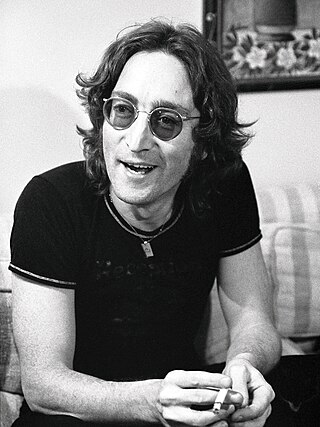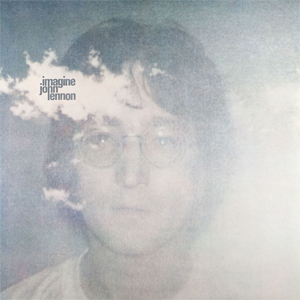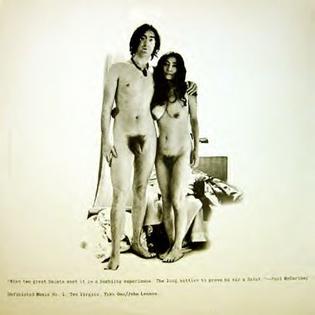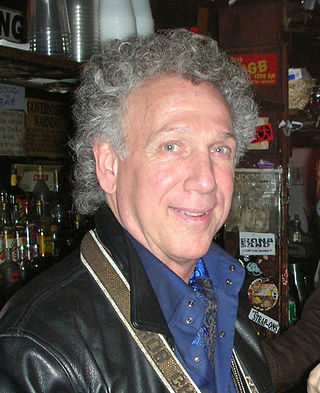Related Research Articles

John Winston Ono Lennon was an English singer, songwriter and musician. He gained worldwide fame as the founder, co-songwriter, co-lead vocalist and rhythm guitarist of the Beatles. His work included music, writing, drawings and film. His songwriting partnership with Paul McCartney remains the most successful in history.

Yoko Ono is a Japanese multimedia artist, singer, songwriter, and peace activist. Her work also encompasses performance art and filmmaking.

John Lennon/Plastic Ono Band is the debut solo studio album by English musician John Lennon. Backed by the Plastic Ono Band, it was released by Apple Records on 11 December 1970 in tandem with the similarly titled album by his wife, Yoko Ono. At the time of its issue, John Lennon/Plastic Ono Band received mixed reviews overall, but later came to be widely regarded as Lennon's best solo album.

Imagine is the second solo studio album by British musician John Lennon, released on 9 September 1971 by Apple Records. Co-produced by Lennon, his wife Yoko Ono and Phil Spector, the album's elaborate sound contrasts the basic, small-group arrangements of his first album, John Lennon/Plastic Ono Band (1970), while the opening title track is widely considered to be his signature song.

Some Time in New York City is a part-studio, part-live double album by John Lennon and Yoko Ono as Plastic Ono Band that included backing by the American rock band Elephant's Memory. Released in June 1972 in the US and in September 1972 in the UK on Apple Records, it is Lennon's sixth album to be released under his own name, and his fourth with Ono. Like Lennon's previous solo albums, it was co-produced by Lennon, Ono and Phil Spector. The album's agitprop lyrics are politically charged compared to its predecessors, addressing political and social issues and topics such as sexism, incarceration, colonialism, and racism.

Wedding Album is the third and final in a succession of three experimental albums by John Lennon and Yoko Ono. It followed Unfinished Music No. 1: Two Virgins and Unfinished Music No. 2: Life with the Lions. In Britain, the album was released credited by "John and Yoko", without last names mentioned. In the United States, it was released credited by "John Ono Lennon & Yoko Ono Lennon."

Unfinished Music No. 2: Life with the Lions is the second of three experimental albums of avant-garde music by John Lennon and Yoko Ono, released in May 1969 on Zapple, a sub label of Apple. It was a successor to 1968's highly controversial Unfinished Music No. 1: Two Virgins, and was followed by the Wedding Album. The album peaked in the United States at number 174, 50 places lower than the previous album. The album, whose title is a play on words of the BBC Radio show Life with The Lyons, was recorded at Queen Charlotte's Hospital in London and live at Cambridge University, in November 1968 and March 1969, respectively. The Cambridge performance, to which Ono had been invited and to which she brought Lennon, was Lennon and Ono's second as a couple. A few of the album's tracks were previewed by the public, thanks to Aspen magazine. The album was remastered in 1997.

Unfinished Music No. 1: Two Virgins is the first of three experimental albums released by John Lennon and Yoko Ono on Apple Records. It was the result of an all-night session of musical experimentation with Yoko in John's home studio at Kenwood, while his wife, Cynthia Lennon, was on holiday in Greece. Lennon and Ono's 1968 debut recording is known not only for its avant-garde content, but also for its cover, which shows the couple naked. This made the album controversial to both the public and the parent record company EMI, which refused to distribute it. In an attempt to avoid controversy, the LP record was sold in a brown paper bag, and distributed by Track and Tetragrammaton in the United Kingdom and the United States respectively. Two Virgins, while failing to chart in the UK, reached number 124 in the US. The album was followed six months later by Unfinished Music No. 2: Life with the Lions.
Elephant's Memory was an American rock band formed in New York City in the late 1960s, known primarily for backing John Lennon and Yoko Ono from late 1971 to 1973. For live performances with Lennon and Ono, the band was known as the Plastic Ono Elephant's Memory Band.

"Give Peace a Chance" is an anti-war song written by John Lennon, and recorded with the participation of a small group of friends in a performance with Yoko Ono in a hotel room in Montreal, Quebec, Canada. Released as a single in July 1969 by the Plastic Ono Band on Apple Records, it is the first solo single issued by Lennon, released while he was still a member of the Beatles, and became an anthem of the American anti-war movement during the 1970s. It peaked at number 14 on the Billboard Hot 100 and number 2 on the British singles chart.
The Plastic Ono Band were a rock band formed by John Lennon and Yoko Ono in 1969 for their collaborative and solo projects based on their 1968 Fluxus conceptual art project of the same name.

"Cold Turkey" is a song written by English singer-songwriter John Lennon, released as a single in 1969 by the Plastic Ono Band on Apple Records, catalogue Apples 1001 in the United Kingdom, Apple 1813 in the United States. It is the second solo single issued by Lennon and it peaked at number 30 on the Billboard Hot 100 and number 14 on the UK Singles Chart. The song's first appearance on an album was Live Peace in Toronto 1969 where the song had been performed live on 13 September 1969 with Lennon reading the lyrics off a clip-board.

"The Ballad of John and Yoko" is a song by the English rock band the Beatles that was released as a non-album single in May 1969. It was written by John Lennon and credited to the Lennon–McCartney partnership, and chronicles the events surrounding the wedding of Lennon and Yoko Ono. The song was the Beatles' 17th UK number-one single and their last for 54 years until "Now and Then" in 2023. In the United States, it was banned by some radio stations due to the lyrics' reference to Christ and crucifixion. The single peaked at number 8 on the US Billboard Hot 100. The song has subsequently appeared on compilation albums such as Hey Jude, 1967–1970, Past Masters, and 1.

Yoko Ono/Plastic Ono Band is the debut solo studio album by Japanese artist and musician Yoko Ono, released on Apple Records in December 1970 alongside her husband's album John Lennon/Plastic Ono Band. The album features Ono's vocal improvisations accompanied by the Plastic Ono Band, with the exception of "AOS", on which she is backed by the Ornette Coleman Quartet.

Fly is the second album by Yoko Ono, released in 1971. A double album, it was co-produced by Ono and John Lennon. It peaked at No. 199 on the US charts.

Iain Stewart Macmillan was the Scottish photographer famous for taking the cover photograph for the Beatles' album Abbey Road in 1969. He grew up in Scotland, then moved to London to become a professional photographer. He used a photo of Yoko Ono in a book that he published in 1966, and Ono invited him to photograph her exhibit at Indica Gallery. She introduced him to John Lennon, and Lennon invited him to photograph the cover for Abbey Road. He worked with Lennon and Ono for several years, staying for a while at their home in New York.

Bob Gruen is an American author and photographer known for his rock and roll photographs. By the mid 1970s, Gruen was already regarded as one of the foremost photographers in music working with major artist such as John Lennon, Tina Turner, the Rolling Stones, Led Zeppelin, Elton John, and Kiss. He also covered emerging new wave and punk rock bands, including the New York Dolls, the Clash, Sex Pistols, Ramones, and Blondie. Gruen has also appeared in films.

"Imagine" is a song by the English rock musician John Lennon from his 1971 album of the same name. The best-selling single of his solo career, the lyrics encourage listeners to imagine a world of peace, without materialism, without borders separating nations and without religion. Shortly before his death, Lennon said that much of the song's lyrics and content came from his wife, Yoko Ono, and in 2017 she received cowriting credit.
This is a summary of 1969 in music in the United Kingdom.
Self-Portrait was a 1969 film made by the artist Yoko Ono. Premiering at the Institute of Contemporary Arts in London in 1969, the 42 minute film consisted of a single shot of her husband John Lennon's semi-erect penis.
References
- ↑ Tillery, Gary (2009). The cynical idealist : a spiritual biography of John Lennon (1st Quest ed.). Wheaton, Ill.: Theosophical Pub. House. p. 96. ISBN 978-0835608756.
- ↑ Harry, Bill (2000). The John Lennon encyclopedia (1. publ. ed.). London: Virgin. p. 234. ISBN 0753504049.
- 1 2 "Erection (John Lennon & Yoko Ono, 1971)". Postiar. Archived from the original on 2 April 2015. Retrieved 15 October 2014.
- ↑ Womack, Kenneth (2014). The Beatles encyclopedia : everything fab four. p. 593. ISBN 978-0313391729.
- ↑ "Oh Yoko: Four by Yoko Ono". Cinema Project. Archived from the original on 9 March 2011. Retrieved 15 October 2014.
- ↑ Levitz, Tamara (2004). "Yoko Ono and the Unfinished Music of 'John & Yoko': Imagining Gender and Racial Equality in the Late 1960s". In Bloch, Avital H.; Umansky, Lauri (eds.). Impossible to hold : women and culture in the 1960s. New York: New York University Press. p. 233. ISBN 0814799108.